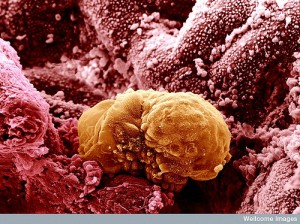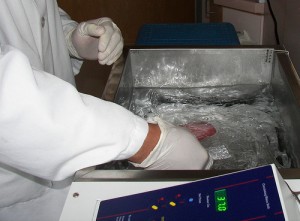Posted on 31 May 2011. Tags: andre vingt trois, curbs, final decision, human embryonic stem cell, human embryonic stem cell research, national assembly, proponents, senate votes, stem cell research, vitro fertilization
 France appeared set to maintain its strict restrictions on human embryonic stem cell research Thursday after the conservative government won over a parliamentary bid to ease up the country’s law on bioethics.
France appeared set to maintain its strict restrictions on human embryonic stem cell research Thursday after the conservative government won over a parliamentary bid to ease up the country’s law on bioethics.
The National Assembly of France voted 73-33 to retain the curbs on Wednesday night. The Roman Catholic Church, as well as conservative legislators protested after a preliminary vote was carried out in the Senate to approve the research.
Revisions on the country’s bioethics law are currently in progress. A second reading of the new bill will be held before the Senate early in June. A final decision is likely to come out by the end of the year.
If the Senate votes to authorize the research, the bioethics bill will go through a conference committee where a version of the bill by the National Assembly will take place.
When it comes to embryonic stem cell research, France has one of the firmer laws in Europe. It has even banned the research, except when it uses imported embryos not for in vitro fertilization in some other countries.
Individuals who oppose embryonic stem cell research claim that it is morally wrong since it damages or destroys human embryos during manipulation. However, proponents of the research believe that it is a bright opportunity to develop new treatments for several medical conditions.
Cardinal Andre Vingt-Trois, France’s head of the Roman Catholic Church, insisted the legislators to oppose the liberalization of the law. He said it would lead to a regression in civilization and state-sponsored eugenics.
Posted in Health
Posted on 02 May 2011. Tags: district of columbia, fertility treatments, illegal activity, medical therapies, panel of judges, paralysis, private companies, regeneration medicine, stem cell research, us court of appeals
 The government can continue funding embryonic stem cell research, the US federal court of appeal ruled on Friday. The decision, which was applauded by many scientists, handed an important victory to the administration of President Obama.
The government can continue funding embryonic stem cell research, the US federal court of appeal ruled on Friday. The decision, which was applauded by many scientists, handed an important victory to the administration of President Obama.
The 2-to-1 decision was made by a panel of judges from the US Court of Appeals for the District of Columbia. It blocks a decision done by the lower court last August, saying stem cell research is an illegal activity under the law that forbids funding on research, which destroys or damages human embryos.
Some proponents of anti-abortion believe that stem cell research is similar to the act of murder as it destroys human embryos, which are donated from fertility treatments, in the process.
However, the court of appeals said on Friday that the law does not extend to past actions as it is written in the present tense. Still, researchers have applauded the decision of the appellate court, saying it offers wider approach for scientists who might find cure for different diseases such as diabetes, blindness and paralysis.
The director of UCSF’s Eli and Edythe Broad Center of Regeneration Medicine, Arnold Kriegstein, said the ruling is not only a victory for the scientists, but is also for the patients who have waited long enough to find cures for their terrible diseases.
He said it allows a significant research to move forward and to continue studies on medical therapies, which could possibly save several lives. Last year, trials on human embryonic stem cell were launched by private companies in order to treat blindness and paralysis.
Posted in Health
 France appeared set to maintain its strict restrictions on human embryonic stem cell research Thursday after the conservative government won over a parliamentary bid to ease up the country’s law on bioethics.
France appeared set to maintain its strict restrictions on human embryonic stem cell research Thursday after the conservative government won over a parliamentary bid to ease up the country’s law on bioethics.
 The government can continue funding embryonic stem cell research, the US federal court of appeal ruled on Friday. The decision, which was applauded by many scientists, handed an important victory to the administration of President Obama.
The government can continue funding embryonic stem cell research, the US federal court of appeal ruled on Friday. The decision, which was applauded by many scientists, handed an important victory to the administration of President Obama.